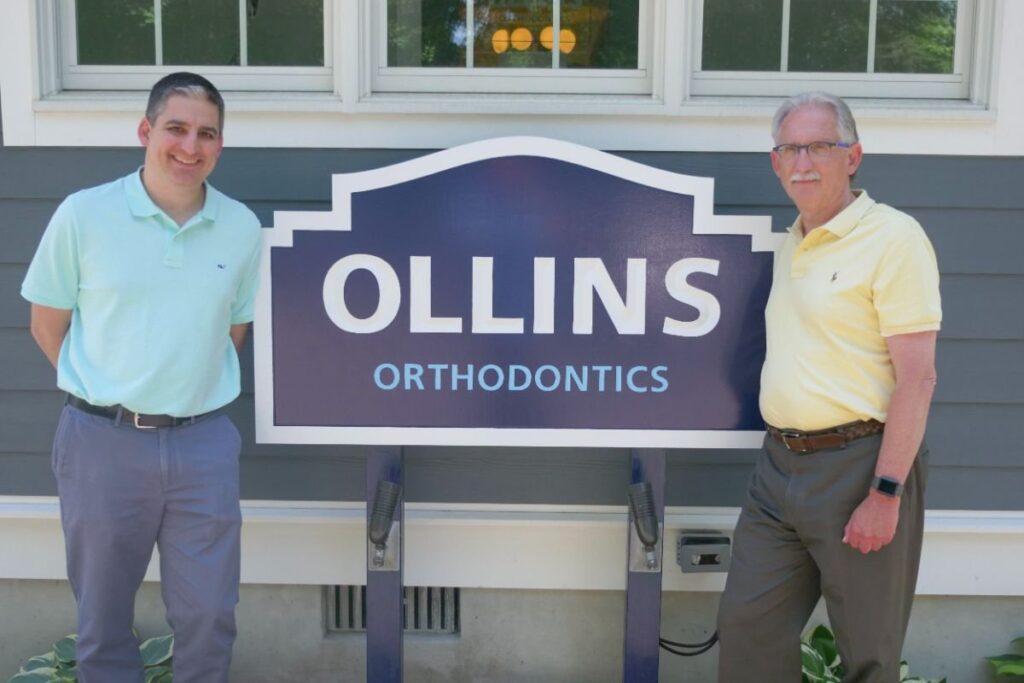Even patients who are diligent with their oral hygiene often need to make adjustments to their routine when wearing braces. Today, our Ollins Orthodontics team will address the question: How can I prevent tooth and gum issues while wearing braces?
How Braces Work
It’s essential to grasp the fundamental mechanics of braces as orthodontic appliances. This pertains specifically to traditional metal and ceramic braces.
- Brackets are square-shaped components affixed to the front surface of each tooth, serving as anchors for wires.
- Wires link the brackets and exert pressure on the teeth as necessary for alignment. They are regularly adjusted and tightened during treatment.
- Elastics may be utilized to apply extra force to particular teeth connected to the brackets.
- Bands serve a similar purpose, providing additional support to the entire orthodontic system.
Potential Issues: Teeth
Braces can cause specific problems, mostly related to oral health and the different elements of the braces.
- Decalcification: This occurs when minerals are lost from the enamel, resulting in white spots or patches on the tooth surface. It can be a concern when plaque accumulates around the brackets and is not adequately removed. Typically, these white spots become visible only after the braces are removed.
- Tooth Decay: Braces can pose challenges in maintaining thorough teeth cleaning, thus elevating the risk of decay.
- Root Resorption: Pressure applied during treatment may cause the roots of teeth to shorten. While mild root resorption is common and usually not worrisome, severe cases can lead to tooth instability.
- Enamel Erosion: Excessive force or pressure exerted by braces can potentially cause enamel erosion, particularly if brackets are misaligned or if there are issues with the bite.

How to Help
The good news is that most of these can be helped—though prevention is always preferable.
- Excellent Oral Hygiene: This is paramount in preventing most issues. Brush your teeth meticulously after each meal and snack, as well as before bedtime. Use fluoride toothpaste and a soft-bristled toothbrush to thoroughly clean around brackets and wires.
- Fluoride is Key: We advocate for the use of fluoride because it strengthens enamel and helps prevent tooth decay.
- Attend Regular Dental Appointments: Collaborating closely with dentists is crucial. It’s essential to uphold your scheduled dental appointments, as they offer additional oversight of your oral health, administer professional cleanings, and promptly address any emerging issues.
- Follow Dietary Guidelines: Limit your intake of sugary and acidic foods and beverages. Additionally, steer clear of hard, sticky, or crunchy foods that can harm braces or become lodged between brackets.
- Orthodontic Wax: This can alleviate discomfort caused by sharp edges of protruding wires or brackets, which may otherwise cause irritation to teeth and gums.
- Mouthguards: If you engage in sports or other contact activities with a risk of facial injury, wearing a mouthguard is essential to safeguard your teeth, braces, and soft tissues from harm.
At the end of the day, the biggest tip we have is to listen to the instructions provided by Dr. Bruce and Dr. Gabriel. Trust the experts in your life for guidance.
Potential Issues: Gums
People sometimes forget that gums are a vulnerable part of their oral health. Taking care of teeth and gums is a two-way street. Here are some of the potential problems you can encounter with your gums while wearing braces.
- Gingivitis: This condition involves inflammation of the gums due to the accumulation of plaque along the gumline. Symptoms may include redness, swelling, or bleeding gums.
- Gum Recession: Gum tissue may recede, exposing the roots of the teeth. Excessive force during orthodontic treatment or insufficient gum tissue support around the teeth can contribute to this issue.
- Gum Irritation: Contact with your braces can lead to abrasions on the gums, lips, and cheeks. This may result in ulcers, sore spots, or cuts on the oral tissue.
Many of these issues have the same solutions as used for conditions involving teeth.
- Remember to brush not only your teeth but also your gums, and prioritize flossing.
- Incorporate antimicrobial mouthwash into your routine to diminish plaque and bacteria in the mouth.
- If you encounter persistent issues or are unsure how to address them, don’t hesitate to reach out to your doctor and our team for guidance.

Solutions You Can Trust
Adjusting to braces can be challenging at first, but rest assured, we’re here to support you every step of the journey! If you’re considering orthodontic treatment, we’d be delighted to assist you. You can sign up for a free consultation by reaching out to our Nutley office at 973-667-0771.

